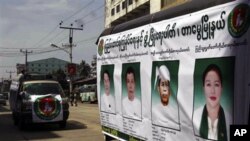Burma’s new parliament, elected last November, will hold its first session on January 31, according to an announcement by state media made on Monday. The meeting will mark the first time a legislative body has met in the country since 1988.
The military-backed Union Solidarity and Development Party won about 80 percent of the elected parliamentary seats. The 2008 constitution allots 25 percent of the seats automatically to the military.
The military says the election is part of its plan to move to democracy and civilian rule.
But Burma’s opposition groups and the international community denounced the election as unfair because it limited the ability of opposition candidates to campaign. Many, including democracy advocate Aung San Suu Kyi, were barred from running.
Sunai Pasuk, the representative for Human Rights Watch in Bangkok, questions whether these steps by the military will bring any significant change to Burma.
"Will this bring serious improvement to a so-called opening up of the country, more democratic? It is not at all, it is not all; it’s simply formalizing the consolidation of power. It’s just a procedural formalization of the military’s domination in Burma and that’s it," Pasuk said.
Also Monday, the military said it will enact a law to allow for the draft of men and women into the armed forces.
Carl Thayer, a political scientist at Australia’s University of New South Wales, says that could see the armed forces competing for people currently working in the private sector in Burma.
"It gives the government the ability to conscript of appropriate educational or technical background, that are better needed, and women as well, for technical services. Under a volunteer army, private enterprise competes for the best talent in the country," said Thayer.
Rights groups accuse Burma’s army of using child soldiers and forcing civilians to work as human mine sweepers and porters. The army is reported to have trouble maintaining force numbers due to desertions. Under the new law, draft dodgers face prison sentences of up to five years.
The new law would also enable the army to draw conscripts from universities, often seen as a major source of dissent.
Regional analysts say the conscripted army is another method of re-enforcing military power. The military has controlled Burma since 1962. In 1990, the opposition led by Aung San Suu Kyi won elections, but the military refused to hand over power.
Aung San Suu Kyi was freed a week after last year’s election, after spending most of the past two decades under house arrest. Her opposition party, the National League for Democracy was disbanded before the November vote and has no seats in the new parliament.
Burma’s New Parliament Set to Meet




